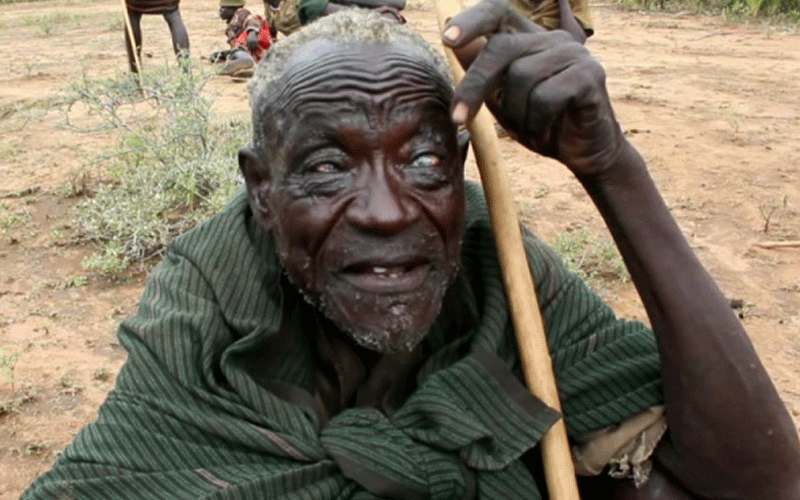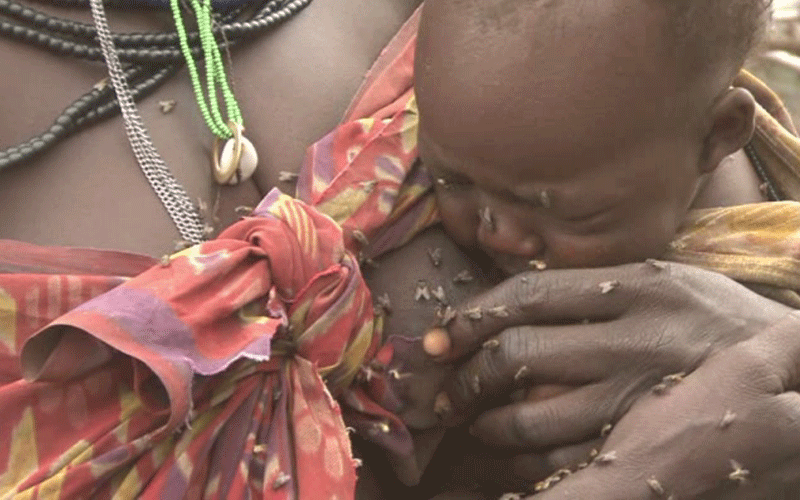Trachoma, too, is feeling the invisible impact of Covid crisis

Emachar Ekelale, a lanky 83-year-old man, sits outside his manyatta next to a small fire in the rural Turkana village of Orupoi.
As flies dart around and land on his worn face, he describes his struggle with trachoma, a devastating eye disease.
Ekelale, finds the pain so intense that he wants to pull out his eyelashes, “When it is painful I just rub and scratch it,” he says through a translator who doubles up as his guide.
Like many people in his village Turkana West, on the border of Kenya and Uganda, Ekelale endured years of repeated eye infections, due to bacteria transmitted by eye-seeking flies.
The disease is spread through contact with infected clothing, hands or flies and affects communities with little access to clean water and sanitation.
More severe manifestations, such as trichiasis that Ekelale suffers from, typically occur in adulthood after multiple untreated infections.
In his village, there is no permanent river for watering livestock and for irrigation.
During drought, they have to cross over to neighbouring Uganda or South Sudan, exposing them to conflict over scarce resources and re-infections.
Families with no men to brave the struggle are disadvantaged.
From further down into the vast Kakuma region, in the northwestern part of the county, Ikao Kolonya, 50, gropes helplessly trying to discover the other people who have come for an eye clinic at Lodwar County and Referral Hospital recently.
Kolonya has been suffering for eight months, depending on people to do simple chores around his home.
“I cannot look after my livestock. I feel wasted,” he begins through a translator.
For a period, Kolonya endured the pain, occasionally using homemade tweezers every two weeks to remove up to five inturned lashes.
It was the only way he could see well enough to do simple household work.
“When I want to go to the market, I can only do so through assistance,” he says.

But after a while, tweezing was no longer effective, and Kolonya’s vision deteriorated.
Trachoma is a painful bacterial infection that scars the membrane lining the inner aspect of the eyelids, making the lashes turn inwards and rub the eye ball, causing a painful, blinding injury.
The World Health Organisation (WHO) says the disease is the world’s leading infectious cause of blindness.
It is endemic in 44 countries and has blinded or visually impaired approximately 1.9 million people globally.
In Kenya, trachoma endemic counties include Turkana, Baringo, West Pokot, Isiolo, Marsabit, Wajir, Narok, Kajiado, Meru, Embu, Kitui and Laikipia.
Dr Sultani Matendechero, head of the Division of Vector Borne and Neglected Tropical Diseases in the Ministry of Health, explains that trachoma is predominantly found in poor and pastoralist communities, where safe and clean water is not readily available.
But the problem in such communities, he continues, is that they prefer to give the little available water to their animals than use it to wash their faces or observe general hygiene.
“Trachoma is incompatible with a clean face,” explains Matendechero.
The doctor notes that the disease is more prevalent in children than adults and women than men.
Children tend to have dirtier faces while women often interact with children, resulting in the observed higher infection rates.
“When the flies land on the children’s faces they transmit trachoma… but women who clean their children with lesos fuels the spread from child to child when they use the same lesos on several children,” explains Dr Matendechero.
It is also endemic in pastoral communities like Ekelale’s due to the increase in population of flies attracted to the livestock. These in turn increase the capacity of transmission.
In Kenya, seven million people live in endemic areas, which put them at risk of getting infected with trachoma.
Approximately 75,000 have already been affected by blinding trachoma or trachomatous trachiasis (TT), adds Matendechero.
In Turkana county, for example, the prevalence rate of active trachoma stood at as high as 42.3 per cent is some sentinel sites while the chronic (Trachoma trachiasis) was 8.9 per cent, according to a baseline survey conducted in 2010.
To eliminate trachoma as a public health problem, the Surgery Antibiotics Facial cleanliness and Environment (SAFE) interventions are implemented as a package.
A 2017 impact assessment for the whole country, after full implementation of SAFE strategy, further showed that TT had reduced to 0.4 percent while active trachoma came down up to 9.9 per cent.
“In 2019, we did another impact assessment whose results are yet to be released, but from the preliminary figures we are seeing Turkana South and East are out of trachoma and even Turkana Central, save some small pockets around Kerio river, while Turkana West and Loima are still endemic,” says Samson Akichem Lokele, trachoma and ophthalmic services coordinator, Ministry of Health and Sanitation, Turkana county.
Trachoma is one of the 20 neglected tropical diseases earmarked by the WHO for control, elimination and/or eradication by 2020.
Where the road ends
Progress towards elimination is gaining momentum, notes Matendechero. In June last year, the WHO reported that the number of people at risk of trachoma had fallen from 1.5 billion in 2002 to just over 142 million in 2019, a reduction of 91 per cent.
Until recently, data on where to intervene were grossly incomplete. Trachoma’s natural home is among populations who live furthest from services, he jokingly laughs.
“I always joke that neglected tropical diseases such as trachoma begin where the road ends.”
The Global Trachoma Mapping Project conducted between 2012 and 2016, which surveyed more than 1,500 districts in 29 countries has sought to remedy the lack of data, with its successful implementation now providing health officials with information they need to plan interventions, for global trachoma elimination.
“At the National NTD programme, we have conducted country surveys and narrowed down into endemic counties.
Furthermore, additional surveys are constantly ongoing to identify the disease distribution and help refine control measures,” Dr Matendechero further explains.
Implementation of the SAFE strategies in target counties has already seen a reduction in trachoma infections.
With the pandemic, health professionals have seen opportunities to leverage to make health services more accessible and improve efforts towards control and elimination of neglected tropical diseases such as trachoma.
Local health authorities are being encouraged to use existing NTD, Water, Sanitation and Hygiene (WASH), behaviour change communication and disease surveillance platforms to support the implementation of Covid-19 related interventions, as appropriate.
And Matendechero further concurs that indeed, against the uncertain landscape of the pandemic, there lies an invisible impact of the Covid-19 pandemic on all public health measures and their importance in protecting communities such as Ekelale’s from NTDs.
Experts say that suffering from some NTDs can weaken one’s immune system, making people even more susceptible to newer diseases such as Covid-19.
The pandemic has demonstrated how governments can advocate for improved hygiene and good handwashing practices and this can be done for face-washing in regards to trachoma as well.
“If you provide water, sanitation, hygiene and behaviour change communication in endemic areas, trachoma disappears,” Dr Matendechero adding that Covid-19 and NTDs like trachoma can both be controlled by taking the same preventive measures.
“It is a fact that there is a high return on investment in providing water in trachoma endemic areas.” he says further.
Lokele says Turkana region has recorded a lot of strides from the latest Covid-19 health measures and through partnerships with agencies working in the eye care space.
“We have really benefitted during this pandemic period because there is water almost everywhere, but we are also urging people to wash their faces even as they wash their hands to enable us control this disease,” explains Lokele.
However, the pandemic has slowed down the achievement of this year’s TT surgeries’ target of 1,000 to just 600 so far. But the county already has a plan for this.
“The strategy is to conduct mass drug administration using azithromycin early next year in the endemic regions of the county, intensify face washing campaigns across the region since the disease comes from facial discharge, flies and dirty fingers and lack of water,” says Lokele.
Lokele notes that close to 1,960 trachoma case finders have been trained on the disease’s effects and how to manage it across the county.
“We have also trained health care workers and volunteers on primary eye healthcare, which helps in identification and referral of trachoma cases in the county.
And this has allowed us to clear a backlog of 14,000 TT cases in Turkana,” he adds.
With that Kolonya has a reason to hope. He learnt about an operation that would improve his vision.
He was among the 100 elderly people who braved the long and treacherous journey to attend a free surgical camp by the Al Momin foundation and other partners at Lodwar County and Referral Hospital.
Cultural beliefs about flies and riches were among factors which made the campaign against trachoma difficult, adds Matendechero.
But besides cultural issues, the trachoma problem in Turkana is further compounded by cross-border infections.
“If we treat trachoma on the Kenyan side, the pastoralists cross border and interact with other communities on the South Sudan or Uganda side.
When this happens at a time they have not been treated too, they transmit the disease to the Kenyan pastoralists and vice versa,” notes Matendechero.










